
396
operations plan and annex and the marshals critique.
1324
Although identified in this filing, these documents were not
produced to the defense until later.
1325
The shooting incident
report was delivered by hand on April 7,
1993;
1326
the situation
reports and the operations plan were delivered on April 10, 1993;
and the Review Group memo and the marshals critique were
delivered on April 12,
1993.
1327
The Weaver trial began the
next day on April 13, 1993.
d. The Defense Subpoena Duces Tecum For the
Shooting Incident Report
On April 13, 1993 the defense filed an ex parte application
for subpoenas duces tecum. Among the subpoenas sought was one
ordering Inspector Thomas W. Miller, who had headed the review
team examining the FBI shooting at Ruby Ridge, to bring" any and
all records used by the 'Shooting Incident Review
Team.'"
1328
Other subpoenas requested the FBI to produce copies of certain
manual provisions and certain personnel files.
1329
Judge Lodge
approved the issuance of these subpoenas on April 14.
1324
These documents were items 1431, 1432, 1433, 1434, and
1435 on the discovery list of items produced. See Government's
Eighth Addendum to Response to Discovery Stipulation, filed March
26,
1993.
[
1325
]
1326
Government Ninth Addendum to Response to Stipulation and
Request for Discovery and Inspection, filed April 7, 1993, at 4-
6.
1327
Government Tenth Addendum To Response to Stipulation and
Request for Discovery and Inspection, filed April 12, 1993, at 3,
5.
1328
Subpoena Duces Tecum to Inspector Miller, April 13,
1993.
1329
See Section IV(O) for a discussion of the compliance of
the government to these other subpoenas.

Page 397 of Report
has been withheld
in its
entirety
pursuant to
5 U.S.C. 552(b)(5),
5 U.S.C. 552(b)(6)
and
5 U.S.C. 552 (b)(7)(C)

398
[
]
Attached to the subpoenas was a letter dated April 12, 1993
from defense counsel Charles Peterson to "potential witness"
advising the witness as follows:
Although the subpoena requires your attendance
on April 17, 1993, I expect that you will not
be called to testify until the completion of
the Government's case, some six weeks into the
trial.
Please call my office as soon as
possible so that you may be advised of a
specific date and time to appear — otherwise
the subpoena requires you to attend
continuously from the beginning of the trial
until your testimony is given. If I am
unavailable, please ask for Diane or
Yvonne.
1337
[
]
1337
Letter from Charles F. Peterson to Potential Witness,
April 12, 1993.
1338
[
1339
[
]
]

Page 399 of Report
has been withheld
in its
entirety
pursuant to
5 U.S.C. 552(b)(5),
5 U.S.C. 552(b)(6)
and
5 U.S.C. 552 (b)(7)(C)
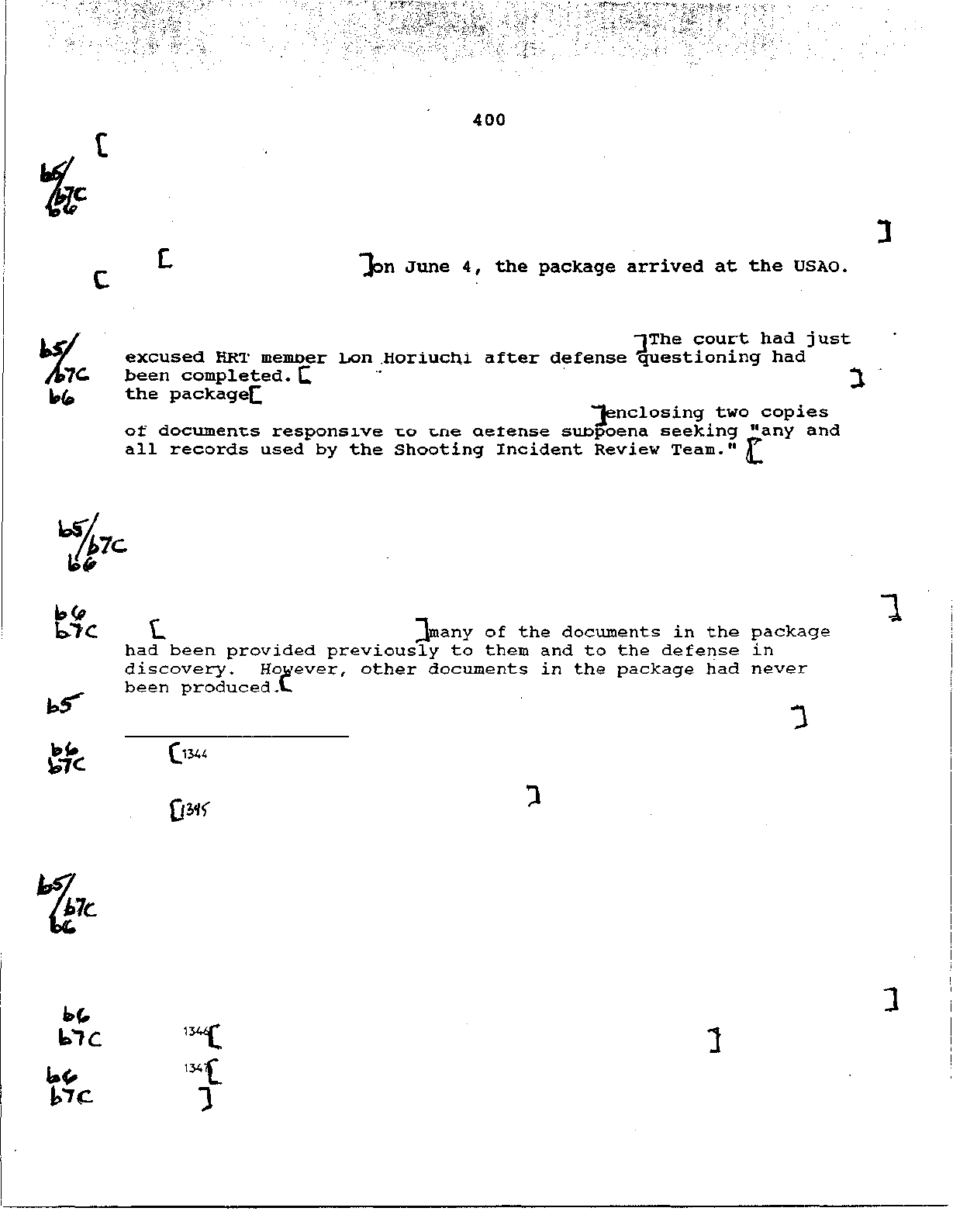
400
[
]
[ ] on June 4, the package arrived at the USAO.
]The court had just
excused HRT
member
Lon Horiuchi after defense questioning had
been completed. [ ]
the package [
] enclosing two copies
of documents responsive to the defense subpoena seeking "any and
all records used by the Shooting Incident Review Team." [
]
[ ]
many
of the documents in the package
had been provided previously to them and to the defense in
discovery. However, other documents in the package had never
been
produced.
[
]
1344
[
]
1345
[
]
1346
[ ]
1347
[
]

401
[ ]
drawings by HRT sniper Horiuchi including a shooting diagram of
the second shot taken through the Weaver front door on August 22,
1992.349 ]
Thereafter[ ] returned to the courtroom and informed the
parties of the package that [ ] had just received. Defense
counsel referred to it as the latest in a series of incidents
that had prejudiced the rights of the defendants and moved for
the case to be dismissed because of alleged prosecutorial
misconduct and for sanctions to be imposed on the government.
[ ] after noting that many of the materials in the package had
been previously produced,
1350
informed the court that [ ]office
was in the process of trying to determine the reasons tor the
late production of these materials. [ ]stressed that [ ]
office produced the materials as soon as they were received and
suggested that the responsibility for the late production of
these materials rested elsewhere. The court deferred a
definitive ruling until after the weekend and then stated,
[T]he Court is very upset about these things
happening. It does appear that it is somewhat
of a pattern on the part of people, agencies
outside of the District of Idaho. The Court
does not agree that there is any evidence that
the U.S. Attorney's Office at least locally, is
doing anything to hinder the prosecution of
this case or prejudice the defense. The
comments of Mr. Howen just now indicate his
veracity and his sincerity in trying to comply
with the rules ... . It seems to be totally
inexcusable and extremely poor judgment on the
1348
See discussion in Section IV(0) which discusses the
problems that occurred at trial because of the untimely
disclosure by the government of discoverable information.
1349
[ ]
1350
[
]

402
part of whoever is involved to send something
like this fourth class mail when a trial of
this nature is going on, the cost and time and
human tragedy that is involved.
1351
[
]
1351
Trial Transcript, June 4, 1993.
1352
[ ]
1353
[
1
3
54 [ ]
1355
[
]
]

403
]
On June 8, the parties made additional arguments to the
court concerning how they should proceed after the disclosure of
the subpoenaed materials. Of particular focus of the parties was
the Horiuchi drawing and its significance. The court reserved
its ruling until the next day but before doing so stated that:
1356
[
]
1357
[
]
1358
[ ]

404
The Court does not excuse the FBI Agency. The
Court thinks there has been a failure to comply
with what was fully understand [sic] to be
required. They get involved in these
technicalities as to who was served, but it is
obvious they had notice of it, they were aware
of what was required, and again, it is not
anytime to be playing games with the Court on
technicalities.
1359
Judge Lodge issued his ruling on June 9 and ordered Horiuchi
to return for further examination in court due to the failure of
the government to produce the materials in a timely manner. In
addition, he assessed against the government the costs and
defense attorney fees for the one-day delay.
1360
Almost five
months later, on October 26, Judge Lodge issued an order imposing
a separate fine of $1920 against the FBI. This fine represented
the fees paid to defense counsel on the day that Horiuchi was
brought back to testify. In this order, which is discussed more
fully in section
IV(o),
Judge Lodge was highly critical of the
actions of the FBI which he believed hampered the ability of the
government to comply with its obligations to produce discoverable
documents including Jencks and Brady materials. As a result of
these actions, Judge Lodge found that the FBI had failed to
comply with its discovery obligations under Fed. R. Crim. P. 16
and held them to be in contempt of court in violation of 18
U.S.C. §
401.
1361
3. Discussion
a. FBI Resistance to USAO Discovery Requests
Our investigation has revealed that the prosecution of the
Weaver matter was plagued and complicated by a continuing series
of disagreements, misunderstandings and preconceptions that
existed between the FBI and the USAO. One of the areas where
such problems surfaced involved the efforts of the USAO to
respond to its discovery obligations in the
case.
[
1359
Trial Transcript, June 8, 1993, at 84.
1360
Id., June 9, 1993, at
60-61.
1361
Order in United States v. Weaver, No. CR 92-080-N-EJL,
filed October 26, 1993, at 2-13 (Appendix at 46).

1362
405
Although the overall effort of the FBI to respond to the
discovery requests of the USAO appeared to have been good, we
have found two areas where problems existed. The first involved
the problems associated with the actions of the FBI Laboratory,
which are discussed elsewhere in this report. The second area
concerned the resistance of personnel at FBI headquarters to
produce a group of documents that was small in number but
significant in importance to the issues in the case.
1562
With regard to the production of this group of documents, it
is our conclusion that FBI personnel, predominantly at the
headquarters level,
1363
imposed unreasonable resistance and
applied inappropriate standards to the discovery requests from
theUSAO, [
]
[
]
1363
[
]
1

Pages 406-410 of Report
have been withheld
in their
entirety
pursuant to
5 U.S.C. 552(b)(5),
5 U.S.C. 552(b)(6)
and
5 U.S.C. 552 (b)(7)(C)

411
Based on our investigation, we conclude that headquarters
personnel were informed of the scope of discovery sought by the
USAO yet failed to take adequate efforts to locate responsive
materials.[
] responsibility in this
case must rest on the doorstep of FBI neadquarters. [
] it was not a well organized
searcn.
[
]
1378
[ ]
1379
[ ]
1380
[
]

Pages 412-414 of Report
have been withheld
in their
entirety
pursuant to
5 U.S.C. 552(b)(5),
5 U.S.C. 552(b)(6)
and
5 U.S.C. 552 (b)(7)(C)

415
[
4.
Conclusion
Although we found no intent by the FBI headquarters
personnel to violate the discovery obligations of the government,
we believe that the FBI unreasonably resisted the efforts of the
USAO to comply with their discovery responsibilities in the
Weaver case. In addition, it appears that the FBI did not put
forth its best efforts in responding to the discovery requests or
the subsequent defense subpoena. Indeed, the decision of the
court in October
19 9 3
to fine the FBI for its intransigence on
1391
(
...continued)
[ ]
1392

416
various discovery issues is consistent with our conclusion.
[
] There is a critical need in the
future to improve the quality of the response of the FBI to
discovery demands. Such improvement must include establishing an
organized system of responding to and monitoring discovery
requests and improving the coordination among FBI components.

417
N.
Alleged Problems With
the
Participation
of the FBI in
Case Preparation
and Its
Relationship With Other Members
of
the
Trial Preparation Team
1.
Introduction
One
of the
issues that arose
as the
various
law
enforcement
entities converged
at
Ruby Ridge
was
which agency
had the
primary
responsibility
for
planning, organizing
and
coordinating
the
activities
of law
enforcement personnel.
It was
decided early
in
the crisis that
the FBI
would have
the
lead role
in the
operations
at
Ruby Ridge. However, after Weaver
and
Harris
surrendered,
the
focus shifted from crisis resolution
to
trial
preparation
and the
U.S. Attorney's Office
in
Boise
("USAO")
assumed
the
lead role. Initially,
the FBI
believed that
it was
to
be the
sole agency assisting
the
USAO
in
trial preparation.
Later,
[ ]
agents from
the U.S. Marshals Service
and the
Bureau
of
Alcohol, Tobacco
and
Firearms
("BATF")
were assigned
by
their respective agencies
to
assist
the
USAO.
[
] The arrival of the marshals and
the BATF agents coupled with disagreements over
how
witness
interviews
in
Iowa were
to be
conducted worsened
the [
]
working relationship between
the FBI and the
USAO.
[
]
2.
Statement
of
Facts
a. Defining
the
Structure
of the
Trial Team
and the
Role
and
Responsibilities
of the
Individual
Members
(1)
The
Lead Agency Concept
and the
Initial
Disagreement Regarding
the
Interviewing
of
Witnesses
in
Iowa
As
the
various
law
enforcement agencies arrived
at
Ruby
Ridge
on
August
21 and
August 22,
1992, it
quickly became evident
that there
was a
need
for one
agency
to
assume
the
leadership
role during
the
crisis. Because
the
assault
of a
federal officer
charge fell within
the
jurisdiction
of the
FBI,
it was
decided
that
it was
appropriate
for the FBI to
perform this role. Once
the crisis
was
over,
and the
focus
had
shifted
to
trial
preparation, [ ] the

418
leadership role was transferred from the FBI to the USAO.
1393
[
]
Another issue that created controversy concerned the
conducting of witness interviews[
]
1393
[
1394
[
1395
[ ]
1396
[ ]
1397
[
]
1398
[
]
(continued.
.
.)

Pages 419-451 of Report
have been withheld
in their
entirety
pursuant to
5 U.S.C. 552(b)(5),
5 U.S.C. 552(b)(6)
and
5 U.S.C. 552 (b)(7)(C)

452
Under the Brady doctrine the government is required to
disclose to the defense material evidence that is both favorable
to the accused and material to either guilt or punishment. See
United States v. Bagley. 473 U.S. 667, 676, 682
1985);
Bradv v.
Maryland. 373 U.S. 83, 87
(1963).
This requirement is not
limited to information that is in written form but extends to
oral statements of which the government is aware. See generally.
Carter v. Rafferty. 826 F.2d 1299 (3d Cir.
1987),
cert. denied.
484 U.S. 101
(1988).
In addition, the prosecutor is responsible
for producing Brady information which is within the knowledge of
persons working as part of the prosecution team or intimately
connected with the government's case. United States v. Butler.
567 F.2d 885, 889 (9th Cir.
1978);
United States v. Morell. 524
F.2d 550, 555 (2d Cir. 1975).[
]
1584
[
]

Page 453 of Report
has been withheld
in its entirety
pursuant to
5 U.S.C. 552(b)(5),
5 U.S.C. 552(b)(6)
and
5 U.S.C. 552 (b)(7)(C)
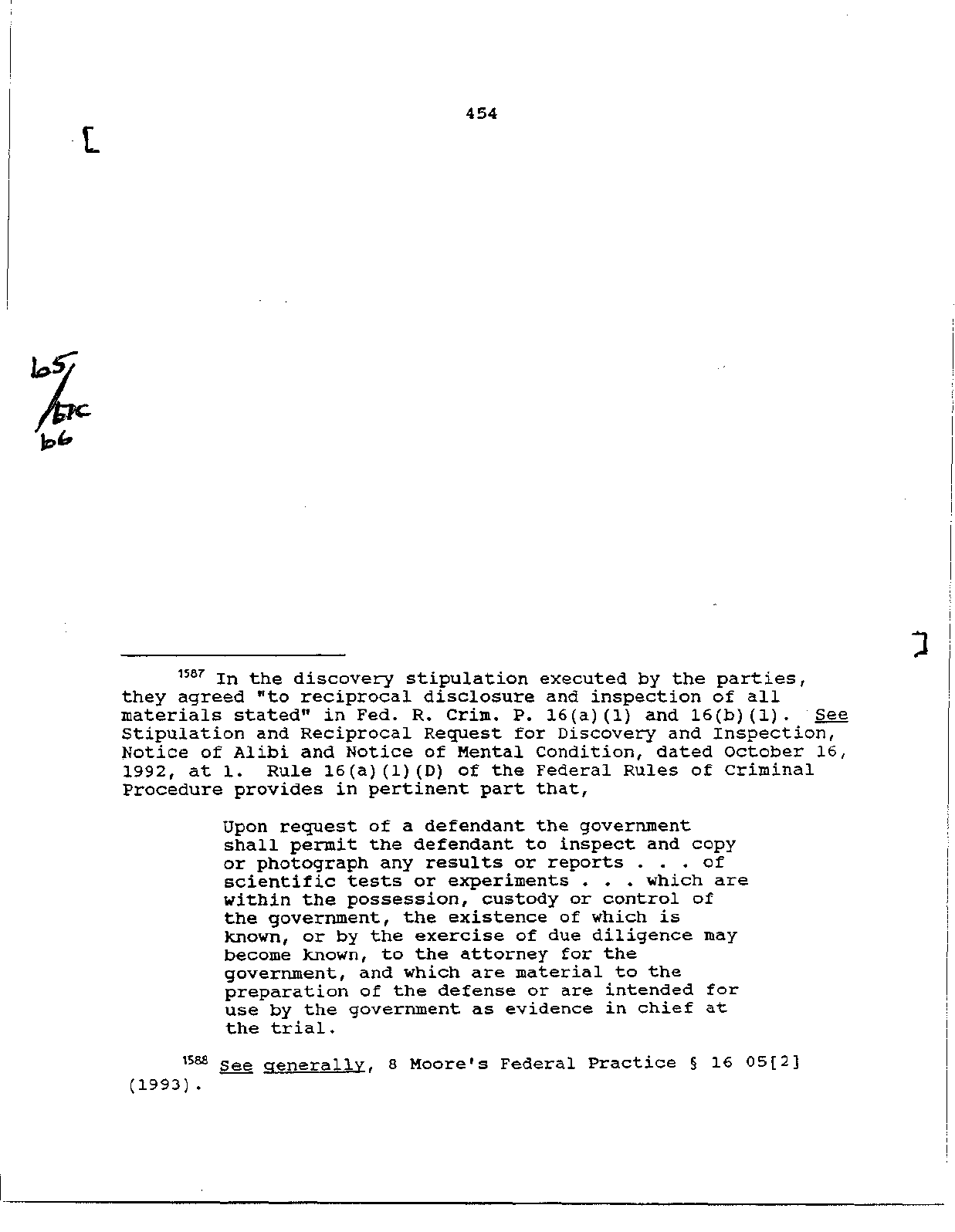
454
1
1587
In the discovery stipulation executed by the parties,
they agreed "to reciprocal disclosure and inspection of all
materials stated" in Fed. R. Crim. P. 16(a)(1) and
16(b)(1).
See
Stipulation and Reciprocal Request for Discovery and Inspection,
Notice of Alibi and Notice of Mental Condition, dated October 16,
1992,
at 1. Rule 16(a)(1)(D) of the Federal Rules of Criminal
Procedure provides in pertinent part that,
Upon request of a defendant the government
shall permit the defendant to inspect and copy
or photograph any results or reports .. . of
scientific tests or experiments . . . which are
within the possession, custody or control of
the government, the existence of which is
known,
or by the exercise of due diligence may
become known, to the attorney for the
government, and which are material to the
preparation of the defense or are intended for
use by the government as evidence in chief at
the trial.
1588
See generally, 8 Moore's Federal Practice § 16 05[2]
(1993).

Page 455 of Report
has been withheld
in its entirety
pursuant to
5 U.S.C. 552(b)(5),
5 U.S.C. 552(b)(6)
and
5 U.S.C. 552 (b)(7)(C)

456
e.
Relationship Among the Investigative Team
]
The behavior of the FBI in the Weaver case revealed their
troubling unwillingness to work as a team player. If the FBI
could not be in control or if its views were not adopted, the FBI
participated in an unreasonable manner [
] Examples of sucn behavior
included the intransigence that the FBI showed with regard to its
opposition to the case agents conducting the interviews of the
Iowa witnesses, the unwillingness of the FBI to accept and work
with representatives from other investigatory agencies, the
failure of the FBI to actively assist the USAO by providing
expert assistance,
1592
and the resistance of the FBI to
producing materials that the USAO believed were discoverable.
[
]
1590
1591
[ ]
[
]
1592
See discussion of this issue in Section
IV(J)
.
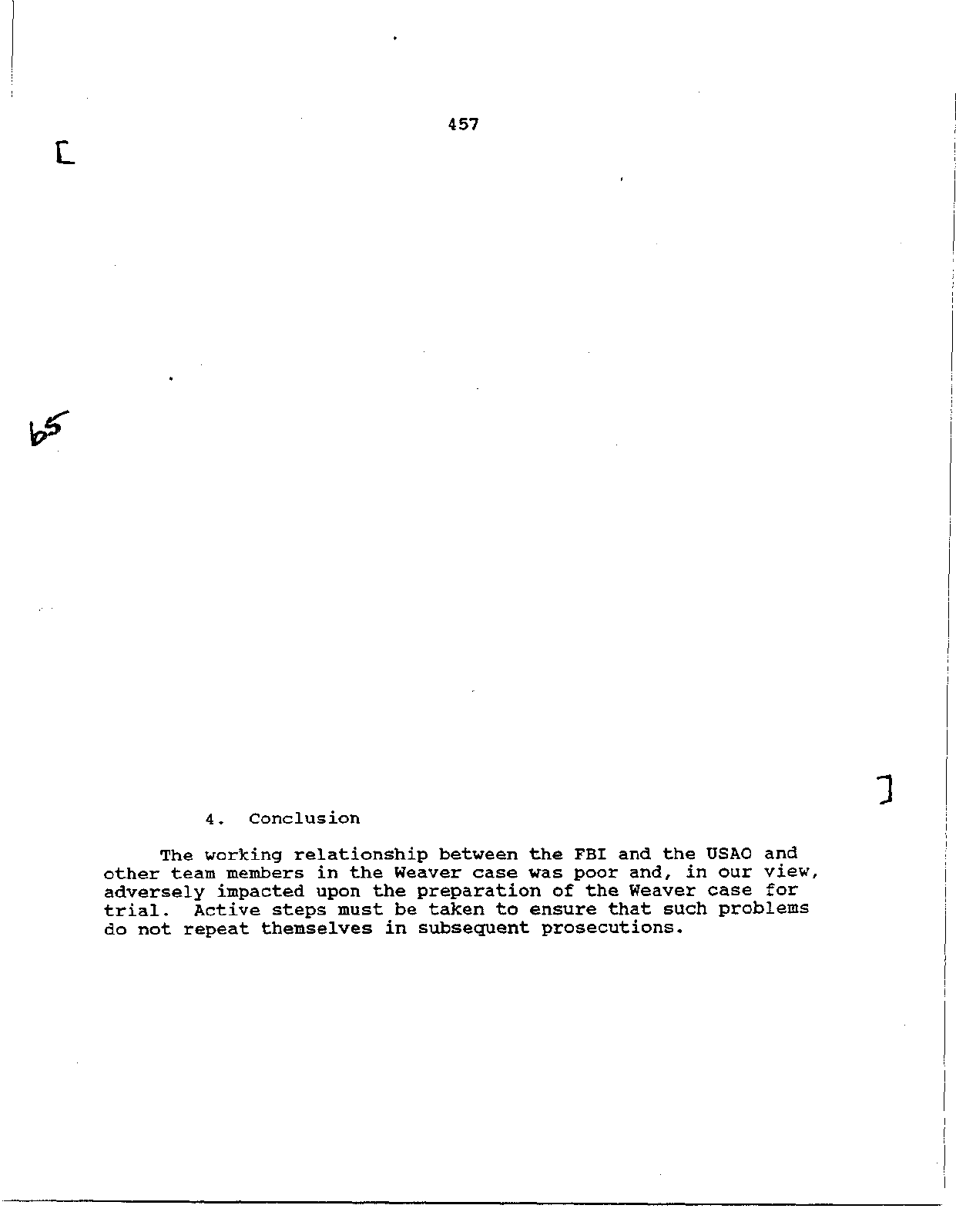
457
]
4.
Conclusion
The working relationship between the FBI and the USAO and
other team members in the Weaver case was poor and, in our view,
adversely impacted upon the preparation of the Weaver case for
trial.
Active steps must be taken to ensure that such problems
do not repeat themselves in subsequent prosecutions.

458
O. Alleged Failure of USAO to Notify the Defense of Brady
Material and Other Important Information
1. Introduction
When the Weaver trial began, the U.S. Attorney's Office in
Boise ("USAO"), assisted by governmental investigative agencies,
had compiled and produced a large volume of materials in
discovery including thousands of pages of documents, transcripts,
numerous audio and video tapes, photographs and a multitude of
investigative reports. In addition, the USAO had permitted
defense counsel to inspect the evidence developed during the case
investigation.
Despite its efforts to comply with its discovery obligations
and the Brady rule, a number of incidents occurred during the
trial which cast doubt on whether the Government had been totally
forthcoming in its responses to the defense. These incidents
included: its resistance to produce FBI and Marshals Service
manual provisions and personnel files subpoenaed by the defense;
the failure to disclose all facets of the compensation
arrangement between the BATF and a confidential informant; the
untimely discovery of critical FBI notes relating to the
interview of Deputy Marshal Cooper; the failure by [
]to notify the defense of potentially exculpatory
information learned during an interview of Idaho State Police
[ ]The untimely production of crime scene photographs
and disclosure of the circumstances surrounding how the
photographs were taken; and the untimely production of materials
associated with the FBI's shooting incident report.
2. Statement of Facts
a. Defense Subpoenas For FBI and Marshals Service
Manuals and Personnel Files
On November 3, 1992, defense counsel Charles Peterson wrote
a letter to Assistant U.S. Attorney Howen identifying five
classes of documents that he considered encompassed by the
discovery stipulation executed by the parties. Two of these
classes were "[a]ny manuals, memorandums or directives outlining
the procedures and standards for developing operational rules of
engagement in the field" and "[a]ny FBI arrest protocols or
instructions." Peterson requested Howen to advise him if he did
not intend to produce any of these materials.
1591
Letter from Charles Peterson to Ronald Howen, November
3, 1992.
1591

459
1592] Peterson did
not respond[ ] nor did he
file a motion to compel production of the ma£erials identified in
his November 3, 1992 letter.
On April 13, 1993, which was the first day of the Weaver
trial,
the defense filed its Third Ex Parte Application for
Issuance of Subpoenad and Payment of Costs and
Fees.
In that
document, they requested the court to issue subpoenas for
numerous individuals and documents including:
4.
Federal Bureau of Investigation, (1) for the
production of any and all FBI manuals which
describe procedures or establish standards
and rules for the apprehension of fugitives,
arrest of subjects or the use of force. By
this request the defendants intend to reach
the publications used by members of the FBI
which describe what the government's
witnesses have testified to as the 'standard
rules of engagement' for that agency, and
any other policy or procedures used by the
agency and its Hostage Rescue Team for the
apprehension of fugitives, arrest of
subjects or the use of force; and (2) the
personnel files in its control for Special
Agent Lon Horiuchi, or Deputy United States
Marshals William Degan, Arthur Roderick, and
Larry Cooper.
The defense also requested similar manuals from the U.S. Marshals
Service as well as any personnel files of Horiuchi, Degan,
Roderick and Cooper that were in their control.
1593
On April
1592
[ ]
1593
See Third Ex Parte Application for Issuance of Subpoenas
and Payment of Costs and
Fees,
filed April 13, 1993 with signed
Order,
dated April 14, 1993. The defense also requested a
(continued...)

460
14,
Judge Lodge issued the subpoenas requested in the ex parte
order.
However, he modified the order drafted by the defense by
adding the following sentence, "[p]ersonnel records to be viewed
only by defense counsel and not to be turned over to third
parties or the media."
1594
By oral motion on April 15, defense counsel Peterson sought
to compel the production of the personnel files and the manual
provisions that the court had ordered the previous day. In
particular, Peterson was seeking the personnel file of Deputy
Marshal Cooper and the Marshals Service manual provisions to
assist in his cross examination of Cooper.
1595
Peterson
characterized the issue as a government failure to comply with
discovery and argued that production of these materials was
required by the recently issued subpoenas.
Howen responded that he could not be expected to respond to
the subpoena when he had not been served with it nor had the
documents in his possession. In addition, Howen told the court
that he would expect counsel at the FBI and the Marshals Service
to handle the responses to the subpoenas. However, he argued
that he was aware of no court that would allow defense counsel to
have direct access to personnel files of witnesses.
1596
Assistant U.S. Attorney Lindquist informed the court that the FBI
case agent had told him that they had received the subpoena and
that FBI Headquarters had been contacted. With respect to the
Marshals Service subpoena, Lindquist stated that he had no
knowledge but would take steps to ensure that the Marshals
Service responded to
it.
1597
The court acknowledged that the subpoena for the personnel
files raised privacy issues and that further restrictions might
be necessary but encouraged the government to facilitate the
response to the subpoenas even if the documents were not within
1593
(.
. .
continued)
subpoena duces tecum be issued for all records used by the
shooting incident review team. A discussion of this subpoena and
the controversial response to it is contained in Section
IV(M).
1594
Id.
1595
Trial Transcript, April 15, 1993, at 142.
1596
Id. at 144-48.[
]
1597
Trial
Transcript, April
15, 1993, at
148-49.

461
their control.
1598
Thereafter, defense counsel Spence agreed to
inform the government of the specific
requests.
1599
The Marshals Service provided the applicable Marshals
Service manual provisions to the USAO on April 16. [
1600
]
On April 23, the defense moved to hold the government in
contempt or to compel it to produce the requested manuals and
personnel files. As of that date, the government had filed
nothing in response to the subpoena.
1601
In court, defense
counsel Nevin stated that he had been advised that the subpoenas
had been served and that Howen had told him that he had the
Marshals Service materials but did not want to produce them.
1602
Howen responded that he viewed this issue as a discovery
dispute
1603
and that he was in the process of drafting a motion
for a protective order. He disputed that the subpoenas seeking
the personnel files had been served although he acknowledged that
he learned that day that the subpoenas for the manuals had been
served. Howen then referenced the November 1992 communications
with defense counsel Peterson regarding the manuals and argued
that Peterson should have sought to compel compliance
earlier.
1604
Nevin responded that the motion to compel was
directed to the recently issued subpoenas not prior discovery
requests.
1605
Thereafter, Lindquist announced that he had the
1598
Id. at
152-54.
1599
Id. at 154-55.
1600
[
]
1601
Memorandum in Support of Motion for Finding of Contempt,
or in the Alternative for an Order to Show Cause and to Compel,
filed April 23, 1993.
1602
Trial Transcript, April 23, 1993,
at.
153-54.
1603
Howen did not think that the November 1992 letter from
Peterson requested discoverable material nor did he understand
how the request related to the issues of the case.
Thus,
after
receiving the letter he made no attempts to secure the requested
material from the
FBI.
[ ]
1604
Trial Transcript, April 23, 1993, at 157-59,
160-62.
1605
Id. at 166.
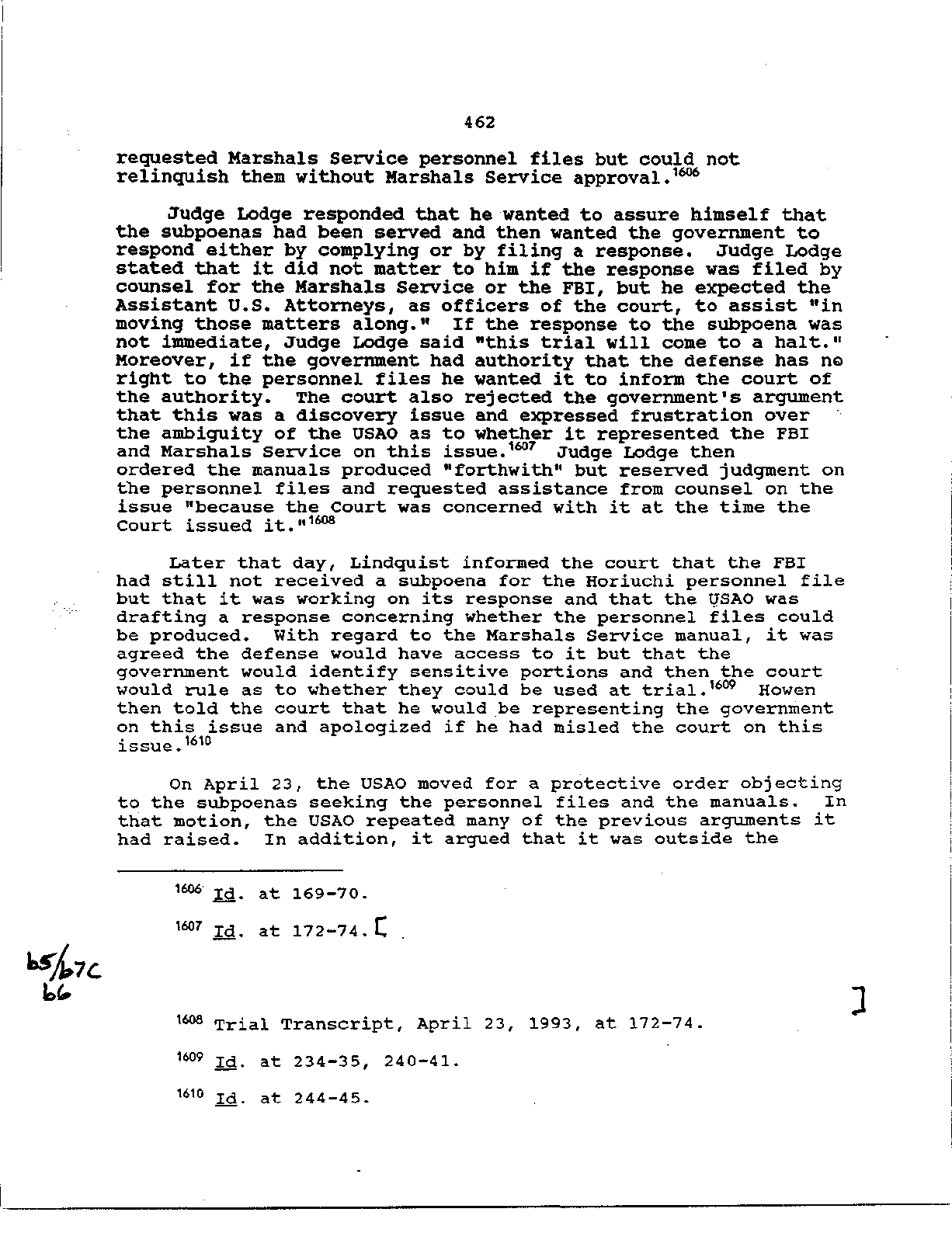
462
requested Marshals Service personnel files but could not
relinquish them without Marshals Service approval.
1606
Judge Lodge responded that he wanted to assure himself that
the subpoenas had been served and then wanted the government to
respond either by complying or by filing
a
response. Judge Lodge
stated that it did not matter to him if the response was filed by
counsel for the Marshals Service or the FBI, but he expected the
Assistant U.S. Attorneys, as officers of the court, to assist "in
moving those matters along." If the response to the subpoena was
not immediate, Judge Lodge said "this trial will come to
a
halt."
Moreover, if the government had authority that the defense has
no
right to the personnel files he wanted it to inform the court of
the authority. The court also rejected the government's argument
that this was
a
discovery issue and expressed frustration over
the ambiguity of the USAO as to whether it represented the FBI
and Marshals Service on this issue.
1607
Judge Lodge then
ordered the manuals produced "forthwith" but reserved judgment
on
the personnel files and requested assistance from counsel on the
issue "because the Court was concerned with it at the time the
Court issued
it."
1608
Later that day, Lindquist informed the court that the FBI
had still not received
a
subpoena for the Horiuchi personnel file
but that it was working on its response and that the USAO was
drafting
a
response concerning whether the personnel files could
be produced. With regard to the Marshals Service manual, it was
agreed the defense would have access to it but that the
government would identify sensitive portions and then the court
would rule as to whether they could be used at trial.
1609
Howen
then told the court that he would be representing the government
on this issue and apologized if he had misled the court on this
issue.
1610
On April 23, the USAO moved for
a
protective order objecting
to the subpoenas seeking the personnel files and the manuals.
In
that motion, the USAO repeated many of the previous arguments
it
had raised. In addition, it argued that it was outside the
1606
Id.at 169-70.
1607
Id. at
172-74.
C
1608
Trial
Transcript,
April
23,1993, at 172-74.
1609
Id.at
234-35,
240-41.
1610
Id.at 244-45.

463
supervisory power of the court to order the production of the
personnel files, that the appropriate procedure was to have a law
enforcement officer familiar with the issues to conduct a
"Henthorn" review
1611
and that the government had ordered those
reviews to be done. It also advised the court that the subpoenas
had not been served on either agency and that the USAO had the
Marshals Service personnel files but not the FBI file. In
addition, the government had requested the FBI and the Marshals
Service to review the manuals for sensitive information and, if
located, the government would request in camera review.
1612
[
1611
This review has its origins in the case of United States
v. Henthorn, 931 F.2d 29 (9th Cir.
1991),
cert. denied, 112 S.Ct.
1588
(199
2) .
In that case, the Ninth Circuit reaffirmed its
holding in United States v. Cadet. 727 F.2d 1453, 1467 (1984)
that once the defendant has made a discovery request for the
personnel files of law enforcement witnesses, the government has
the "duty" to review these personnel files to determine if they
contain material information that is favorable to the defendant.
If the prosecutor is uncertain whether any information is
material,
he can submit the matter to the court for in camera
review. The personnel files do not need to be produced "to the
defendant or the court unless they contain information that is or
may be material to the defendant's case." United States v.
Henthorn, 931 F.2d at 31; accord, United States v. Dominguez-
Villa. 954 F.2d 562, 565 (9th Cir.
1992);
United States v. Cadet,
727 F.2d at
14
68.
The review of the personnel files need not be
done by the federal prosecutor responsible for the case. It is
sufficient if an appropriate agency attorney or a member of his
staff conduct the review and then notify the prosecutor of the
results of the review. The prosecutor is then responsible for
determining if the information is potentially Brady material and
if so whether it should be produced or submitted to the court for
in camera review. See United States v. Jennings, 960 F.2d 1488,
1492,
n.3 (9th Cir.
1992).
1612
Government Motion for Protective Order, For In Camera
Inspection and Motion to
Seal,
filed April 23, 1993, at 3-6.

Page 464 of Report
has been withheld
in its entirety
pursuant to
5 U.S.C. 552(b)(5),
5 U.S.C. 552(b)(6)
and
5 U.S.C. 552 (b)(7)(C)
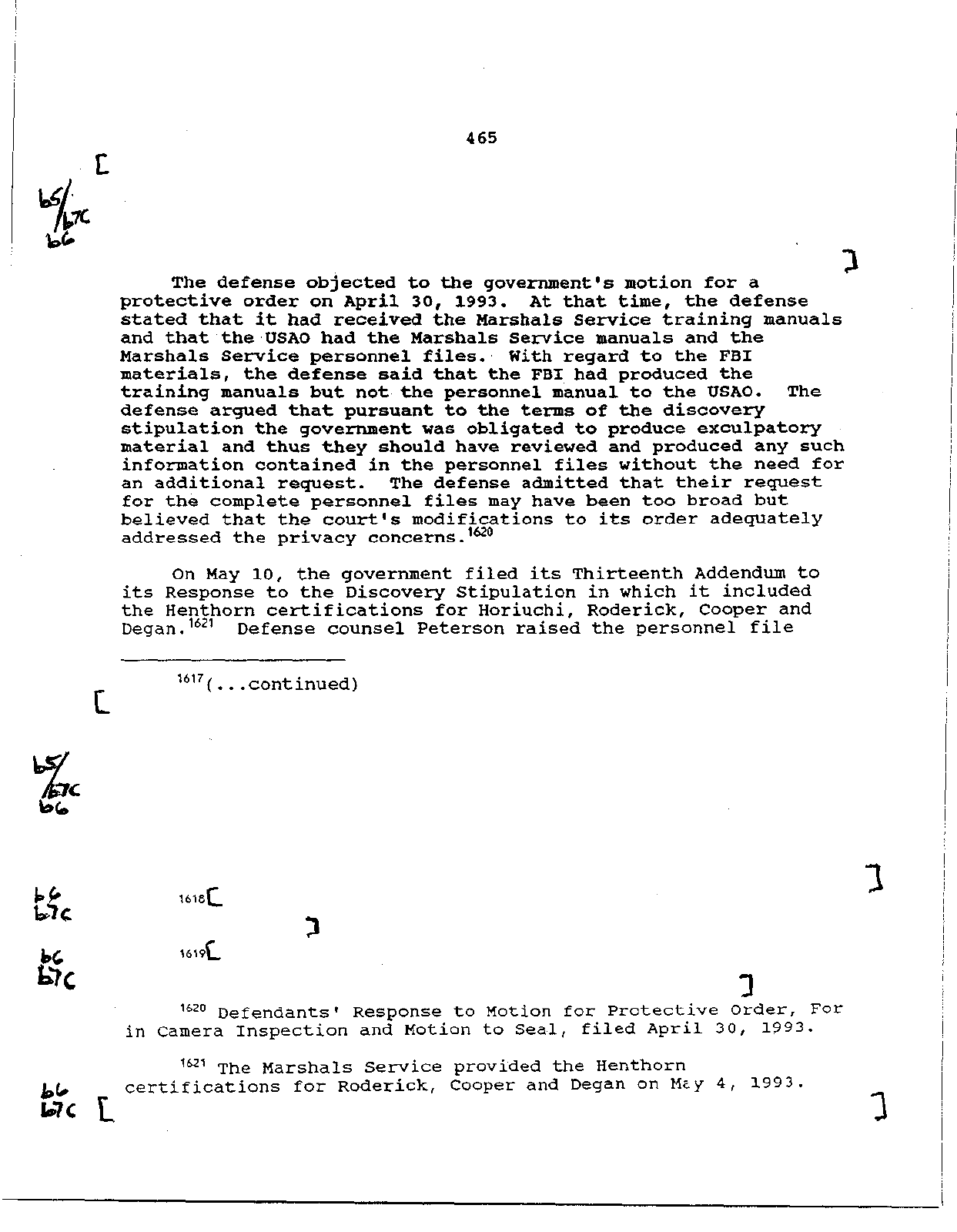
465
[
]
The defense objected to the government's motion for a
protective order on April 30, 1993. At that time, the defense
stated that it had received the Marshals Service training manuals
and that the USAO had the Marshals Service manuals and the
Marshals Service personnel files. With regard to the FBI
materials,
the defense said that the FBI had produced the
training manuals but not the personnel manual to the USAO. The
defense argued that pursuant to the terms of the discovery
stipulation the government was obligated to produce exculpatory
material and thus they should have reviewed and produced any such
information contained in the personnel files without the need for
an additional request. The defense admitted that their request
for the complete personnel files may have been too broad but
believed that the court's modifications to its order adequately
addressed the privacy concerns.
1620
On May 10, the government filed its Thirteenth Addendum to
its Response to the Discovery Stipulation in which it included
the Henthorn certifications for Horiuchi, Roderick, Cooper and
Degan.
1621
Defense counsel Peterson raised the personnel file
1617
(. . .continued)
[
]
1618
[ ]
1619
[
]
1620
Defendants' Response to Motion for Protective Order, For
in Camera Inspection and Motion to
Seal,
filed April 30, 1993.
1621
The Marshals Service provided the Henthorn
certifications for Roderick, Cooper and Degan on May 4, 1993.
[ ]

466
issue again in court that day and repeated his argument that the
defendants were entitled to access to the personnel files.
Lindquist indicated that neither the FBI nor the Marshals Service
had received a subpoena for the personnel files
1622
and that he
and Howen had made it clear to defense counsel that the personnel
files and manuals could only be obtained by subpoena.
1623
The
court opined that the procedure set forth in the Henthorn case
was controlling and the complete personnel file did not need to
be produced unless such production was necessary to satisfy the
Government's disclosure obligations.
1624
[
]
On May 17, the court ruled on the personnel file issue. It
noted at the outset that even though the personnel files were not
specifically addressed in the discovery stipulation, the federal
prosecutor, under Ninth Circuit law, has the obligation by virtue
of his oath of office to produce Brady material without a court
order.
Furthermore, the court held that "[c]ounsel for the
government should have undertaken this search in advance of
trial,
on their own initiative." It approved the procedure
proposed by the government which was to have the law enforcement
agent knowledgeable about the issues in the case to review the
files for Brady material. If Brady material did not exist, the
defense was to be informed; if Brady material was located it was
to be presented to the defense; and if the material was
questionable, the court was to conduct an in camera review and
make a determination as to whether it should be produced. The
court ordered that this review should be done no later than two
days before the witness is to testify and with regard to those
1622
Trial Transcript, May 10, 1993, at 8.
1623
Id. at 10.
1624
Id. at 152.
1625
[
]
1626
[
]

467
witnesses who have already testified, the review should be
conducted "post haste."
1627
Later that day, defense counsel
Spence stated that the only personnel file that they needed was
the file of Lon Horiuchi.
1628
[
]
b.
Financial Compensation of Informant Fadeley
It was the gun sale between Weaver and a government
informant that provided the basis for the initial criminal
charges brought against him. The Government also planned to
introduce statements that Weaver had made to the informant during
four taped conversations as evidentiary support for its
conspiracy theory. After informal attempts to learn the identity
1627
Order, filed May 17, 1993, at 1-4.
1628
On May 21, 1993, the government produced the Henthorn
certifications for Deputy Marshals Hunt, Norris and Thomas.
Government Fourteenth Addendum to Response to Discovery
Stipulation, filed May 21, 1993.
1629
[ ]
1630
[ ]
1631
[ ]
1632
[ ]
1633
[ ]
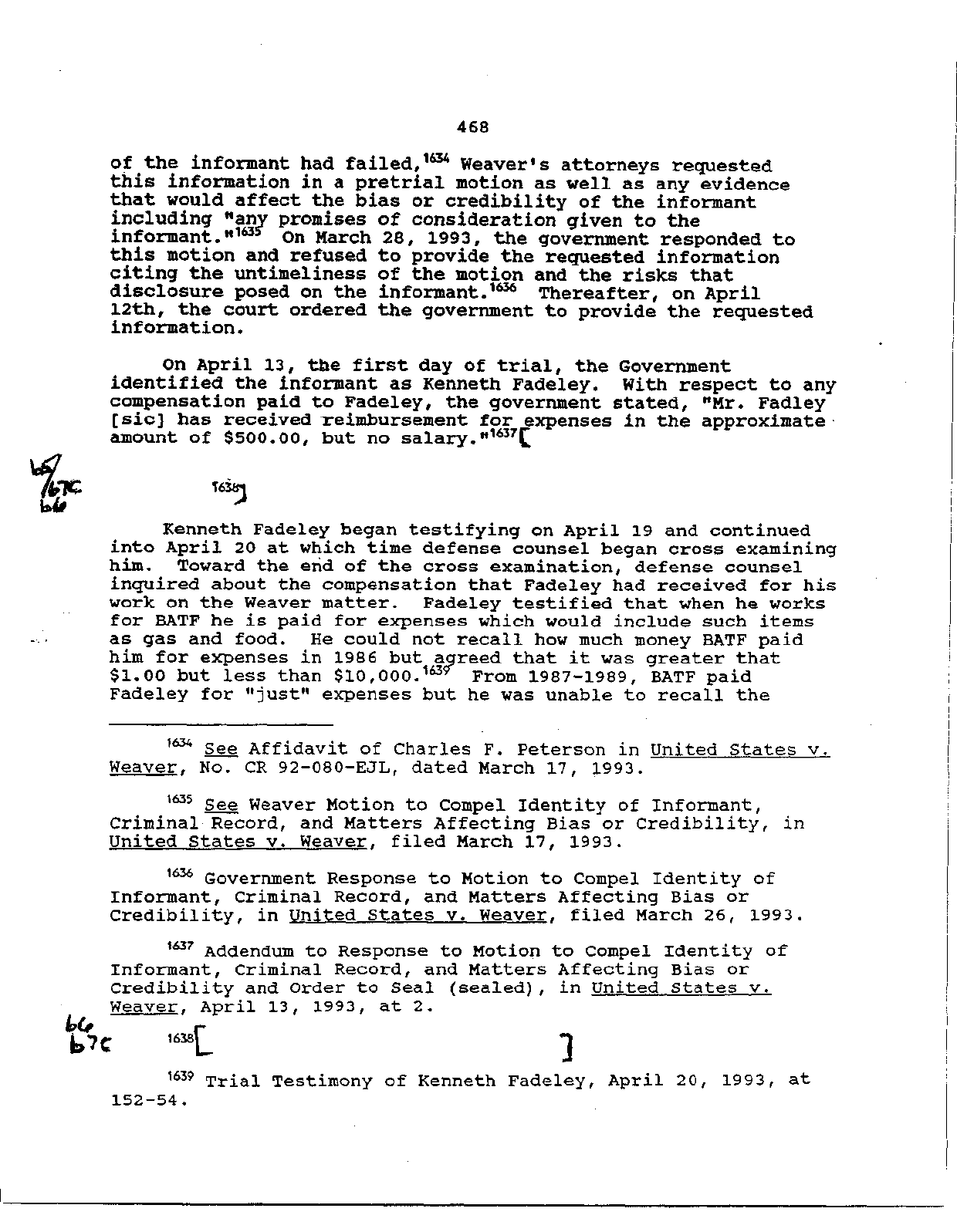
1638
468
of the informant had failed,
1634
Weaver's attorneys requested
this information in a pretrial motion as well as any evidence
that would affect the bias or credibility of the informant
including "any promises of consideration given to the
informant."
1635
On March 28, 1993, the government responded to
this motion and refused to provide the requested information
citing the untimeliness of the motion and the risks that
disclosure posed on the informant.
1636
Thereafter, on April
12th,
the court ordered the government to provide the requested
information.
On April 13, the first day of trial, the Government
identified the informant as Kenneth Fadeley. With respect to any
compensation paid to Fadeley, the government stated, "Mr. Fadley
[sic] has received reimbursement for expenses in the approximate
amount of $500.00, but no
salary."
1637
[
]
Kenneth Fadeley began testifying on April 19 and continued
into April 20 at which time defense counsel began cross examining
him. Toward the end of the cross examination, defense counsel
inquired about the compensation that Fadeley had received for his
work on the Weaver matter. Fadeley testified that when he works
for BATF he is paid for expenses which would include such items
as gas and food. He could not recall how much money BATF paid
him for expenses in
198 6
but agreed that it was greater that
$1.00 but less than $10,000.
1639
From 1987-1989, BATF paid
Fadeley for "just" expenses but he was unable to recall the
1634
See Affidavit of Charles F. Peterson in United States v.
Weaver,
No. CR 92-080-EJL, dated March 17, 1993.
1635
See Weaver Motion to Compel Identity of Informant,
Crimial Record, and Matters Affecting Bias or Credibility, in
United States v. Weaver, filed March 17, 1993.
1636
Government Response to Motion to Compel Identity of
Informant, Criminal Record, and Matters Affecting Bias or
Credibility, in United States v. Weaver, filed March 26, 1993.
1637
Addendum to Response to Motion to Compel Identity of
Informant, Criminal Record, and Matters Affecting Bias or
Credibility and Order to Seal
(sealed),
in United States v.
Weaver,
April 13, 1993, at 2.
1638
[
]
1639
Trial Testimony of Kenneth Fadeley, April 20, 1993, at
152-54.

469
amount paid.
1640
Later, after Fadeley agreed that he had not
assisted the government in this case for money and that BATF had
never paid him any type of salary other than the payment of
expenses,
the following exchange occurred:
Q .... When you first started working for
ATF,
were you told that you would be paid on
a case-by-case basis?
A I was told I'd be paid expenses for my work.
Q Expenses. Were you told that you'd get paid
after a case was made against a person?
A After we concluded a case, there may be a
monetary settlement, possibly.
Q Okay. "After we concluded a case, there may
be a monetary settlement"? Oh, let's talk
about this case then. First of all, in order
to conclude a case, you would have to get a
guy to trial in the case, is that right?
A I would assume so.
Q And you would assume that not only would you
have to get him convicted, right?
A If he was guilty.
Q
Well,
if you don't get a conviction, you
don't get any money; isn't that right?
A I would assume so.
Q And that's not just your assumption, sir,
that's your understanding about this case
too,
isn't it? If Randy Weaver gets
acquitted of this gun case, you don't get
paid; right?
A I guess
so.
1641
Following this exchange, Fadeley testified that he did not know
how much money he would be paid if Weaver were convicted and
1
6
40 Id. at 154-55.
1
6
41 Id. at
160-61.

470
insisted that the amount of any future award had no impact on his
testimony.
1642
On April 20, defense counsel Spence moved in open court to
strike the testimony of Fadeley and to dismiss all counts of the
indictment based upon the Fadeley testimony. Spence argued that
Fadeley was
a
contingent fee witness and that it was unlawful to
permit such testimony to be used at trial.
1643
Howen denied
that Fadeley was
a
contingent fee witness and argued that
Fadeley's testimony regarding any future compensation that he
might receive was partially based on his confusion regarding
money Fadeley might receive in the future under the witness
protection program to compensate for "any differential or loss to
him in either his job, his home, or other items."
1644
Howen
then represented that BATF Agent Byerly, who communicated with
Fadeley regarding financial compensation, would testify that
Fadeley was paid for expenses and then was told that he "could be
held for an award at
a
later time."
1645
Howen maintained that
such an arrangement did not constitute
a
contingent fee
agreement. Thereafter, the court took the matter under
advisement but declined to declare a mistrial.
1646
The government recalled Byerly to address the Fadeley
compensation issue. Byerly testified that Fadeley was neither an
agent nor
a
salaried employee of BATF. He explained that he had
made an agreement with Fadeley whereby Fadeley would be
reimbursed for his necessary investigative expenses associated
with attending the Aryan Nations summer conferences in
198
6,
1987
and
19 89
and that for the entire period that Fadeley was
assisting BATF he was paid expenses of
$445.
In addition, Byerly
testified that he had informed Fadeley that he could receive an
award after
a
case was completed. Byerly stated, "I explained to
Mr.
Fadeley that at the end of the case, whatever it might be,
at
the end of the judicial proceedings that
I
would submit his name
to my supervisors for an award."
1647
According to Byerly, his
recommendation would be reviewed by several layers of supervisors
who could approve, increase or reduce the award. Byerly insisted
1642
Id.
at
161-63,
179.
1643 Trial
Transcript,April 20,1993,at 6-10.
1644
Id. at 11-13.[
]
1645
Trial
Transcript,
April
20,1993,
at 12-13.
1646
Id.
at 14-15.
1647
Trial Testimony of Herbert Byerly, April 20, 1993,
at
68-70.

471
that the award was not influenced by the outcome of a case and
that he had never informed Fadeley otherwise.
1648
Indeed, Byerly
testified there were instances where informants received awards
for work on cases that were never
prosecuted.
1649
[
1650] He said that he
anticipated that he was going to recommend that Fadeley receive
an award of $3,500 for his work on the Weaver case. Byerly
insisted that Fadeley was mistaken if he believed that the award
was contingent upon there being a conviction in the case.
1651
On April 21, defense counsel filed a motion to strike the
Fadeley testimony arguing that it was improper because Fadeley
had been promised a contingent fee if Weaver were convicted. In
addition, they complained that the prosecutors had an obligation
to disclose this arrangement to the defense prior to trial but
had failed to do so. Moreover, they argued that the government's
denial that Fadeley had been paid any fee constituted
misconduct.
1652
In its response, the government denied that a
contingent fee arrangement existed between BATF and Fadeley and
then repeated its argument that Fadeley's responses were affected
by his confusion over financial benefits he might receive under
1648
Id. at
70-72.
1649
Id. at 75.
[
1650
]
1651
Byerly Trial Testimony, April 20, 1993, at
76-79.
1652 See weaver Motion to Strike Testimony of Kenneth Fadley
[sic] and Memorandum in support thereof, in United States v.
Weaver,
filed April 21, 1993.

472
the witness protection program. Howen also denied having prior
knowledge of the possible monetary award from BATF.
1653
Judge Lodge ruled on the motion to strike on May 17 and
found that although "Fadeley believed that he was involved in a
contingency fee arrangement," the testimony of agent Byerly
indicated that the government did not intend for a contingency
fee arrangement to exist.
1654
Consequently, the circumstances
did not exist to warrant the striking of the Fadeley testimony.
However, Judge Lodge ruled that a cautionary instruction
regarding how to evaluate the credibility of Fadeley would be
appropriate.
1655
On May 19th, the Government informed the
defense of the amounts that Fadeley had received for expenses,
and awards and the amount of the proposed cash award.
1656
[
]
1653
See Government Response to Motion to Strike Testimony of
Kenneth Fadeley.
1654
Order in United States v. Weaver, dated May 17, 1993, at
7-8.
1655
Id. at 8.
1656
Government Second Addendum to Response to Motion to
Compel Identity of Informant, Criminal Record, and Matters
Affecting Bias or Credibility, and Order to
Seal,
filed May 19,
1993.
1657
[
]
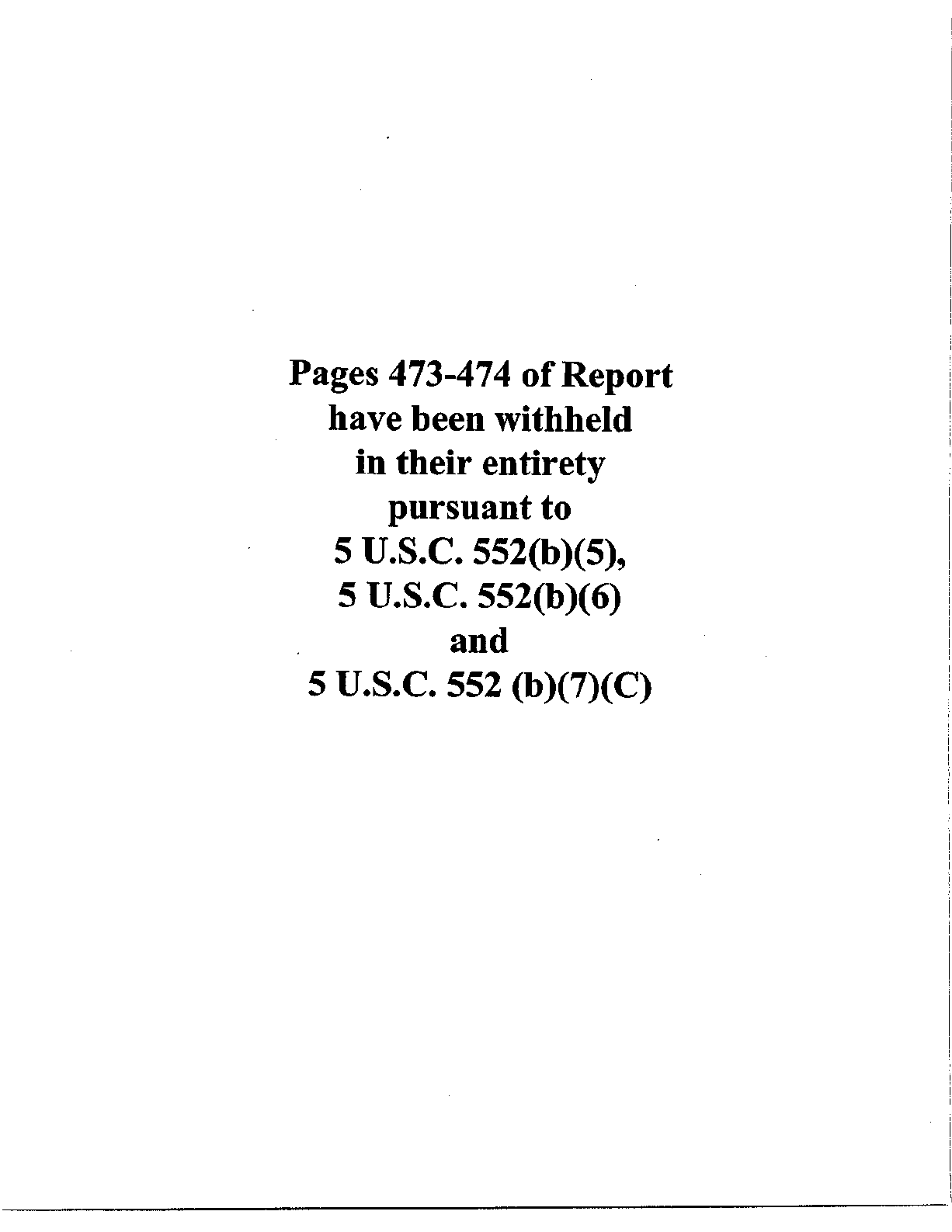
Pages 473-474 of Report
have been withheld
in their entirety
pursuant to
5 U.S.C. 552(b)(5),
5 U.S.C. 552(b)(6)
and
5 U.S.C. 552 (b)(7)(C)
